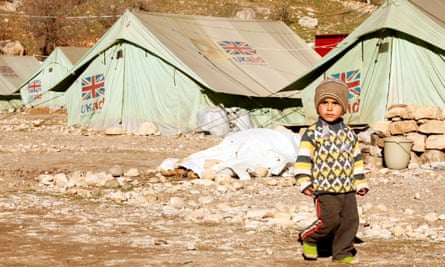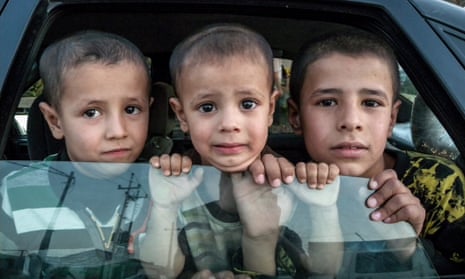A second senior government minister has reiterated that Christians will be the focus of the government’s 12,000 humanitarian intake from Syria, as the prime minister, Tony Abbott moves to reassure the community that all persecuted minorities will be considered for resettlement.
On Wednesday, Abbott announced that Australia would resettle 12,000 refugees fleeing the conflict in Syria and Iraq, on top of the existing 13,750 humanitarian intake.
The social services minister, Scott Morrison, said Christian Syrians would make up the bulk of the intake.
“Middle Eastern Christians have been run out of town in the Middle East now for many years and that is why our government right from the outset has had a much higher priority focus on those persecuted minorities in the Middle East which are predominately Christian and that is where our focus will be,” Morrison told reporters.
Morrison’s comments come just days after his cabinet colleague, government Senate leader Eric Abetz, said that Christians should be “high up on the priority list”.
“Given the plight of Christians, I think a very strong case can be made that Christians should be prioritised,” he said on Tuesday.
The grand mufti of Australia, Ibrahim Abu Mohamed, took issue with the government prioritising Christians for resettlement, saying it was discriminatory.
“When it comes to catastrophes such as these we should be prioritising human beings rather than prioritising a certain religion,” he told Guardian Australia.
Abetz labelled Mohamed’s objections as a “misunderstanding or something else” of his comments.
“The advice I have at least is that they won’t have anywhere else to go, even if peace is restored, and therefore to make them a focus – not the only focus, but a focus ... is I think perfectly reasonable,” Abetz told reporters on Thursday. “I would invite anybody who wants to take issue with what I said to actually have a look at what I said.”
Abbott, who is attending the Pacific Islands Forum in Papua New Guinea, did not single out Christian refugees as the focus of the resettlement scheme.
“We’re resettling persecuted minorities – people who cannot realistically ever hope to return,” he said. “Some will be Muslim, some will be Christian, but the point is: these are people who have been displaced by war and because of the changes engulfing the Middle East, it’s unlikely that they will ever, ever be able to go back.”

Labor thinks religion should not be the only factor that is taken into consideration when deciding who is persecuted.
“You need to think about a range of characteristics that make a person vulnerable, and you need to judge based on who needs the most help” the shadow foreign minister, Tanya Plibersek, told Sky News. “Of course, religion is a factor making people vulnerable to attack.”
Muslim and Christian religious leaders alike raised concerns with Morrison’s comments at a forum in Sydney’s west on Thursday.
Sheikh Wesam Charkawi, from the Lakemba mosque, welcomed the additional 12,000 places but said Australia’s intake “should be based on need, not creed”. “Many millions are suffering, but there is also a majority Muslim population that’s suffering,” he said.
He was joined by Father Rod Bowers of the Gosford Anglican church, who said favouring Christians “sends entirely the wrong message to the Australian community”. “It should be based on need, and on no other criteria than that,” he said.
Community advocate and solicitor Lydia Shelly questioned Wednesday’s announcement of an additional $44m of aid to the region, arguing a greater sum had been cut from the aid budget to the Middle East in the past two years.
Australia’s grand mufti also reiterated his concerns, warning in a statement the rhetoric by some ministers could “set a dangerous precedent [and] have serious repercussions on the social fabric of Australian communities, and foster a discriminatory environment”.
Plibersek on Thursday ruled out supporting sending ground troops into Syria, after the government announced on Wednesday that it would extend airstrikes into the war-torn country.
“We don’t want to be drawn into what could become a proxy war between different parties for control of Syria. There has to be a political resolution,” Plibersek said. “I don’t think Australia should be sending troops – boots on the ground, as they say.”
The defence minister, Kevin Andrews, said on Thursday Australia’s military engagement in Syria could last for two to three years.
The former chief of the defence force, Peter Gration, told ABC TV the conflict in Syria will not be resolved in the near future.
“It is likely to be protracted. I think 10 years is not an unreasonable estimate. The outcome then will be probably indecisive, a long period of combatting an insurgency in Syria,” he said.
He warned that Australia had “bought in” to a centuries-old sectarian conflict by partaking in the airstrikes.
“I was saddened to hear that our prime minister and our government have decided to do this,” Gration said. “I think the first thing that people ought to be asking is: What on earth are we doing there? I think there are some sound reasons for not doing it but we are now committed and we will have to deal with it.”

Comments (…)
Sign in or create your Guardian account to join the discussion